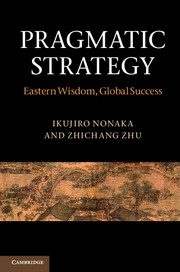8 - Questioning the conventional paradigm
Published online by Cambridge University Press: 05 June 2012
Summary
We do strategies not in complete doubt but informed by paradigms. What paradigm was behind the strategies that led to the current crisis and calamity? That question is the focus of this chapter. Our self-examination will be critical, but with a positive purpose: to appreciate the value and urgency of a pragmatic turn. Being critical and positive, we organise our analysis under three headings: ‘Closing the practice gap’, ‘Bringing ethics back in’, ‘Overcoming specialised deafness’.
CLOSING THE PRACTICE GAP
Harvard University is admired not only for its leading-edge research but also for its wealth – an endowment standing at $37 billion as of 30 June 2008. In past years, the Harvard Management Company (HMC), the university’s fund-management arm, made investments in everything from private equity to property to commodities. ‘Harvard has become an investment bank with a university attached’, said a Harvard employee. Then the 2009 financial year wiped out 30 per cent of the endowment, and the university froze salaries and proposed 275 job cuts. Like the citizens in the main street, the professors at Harvard were unhappy: ‘These people have made fortunes losing money for the endowment [HMC managers got paid between $2 million to $6.4 million a year]. Now they want us to foot the bill.’ How could this have happened given the numerous Harvard Business Review articles and Harvard Business School strategy case studies on everything from industry analysis to risk management to corporate governance?
- Type
- Chapter
- Information
- Pragmatic StrategyEastern Wisdom, Global Success, pp. 325 - 369Publisher: Cambridge University PressPrint publication year: 2012



